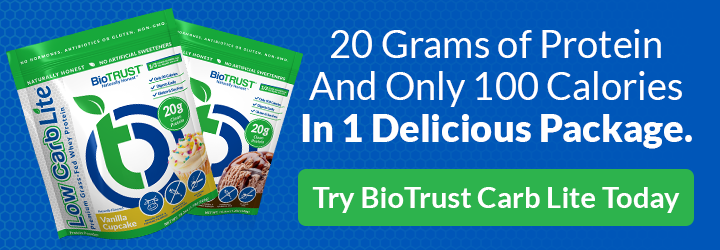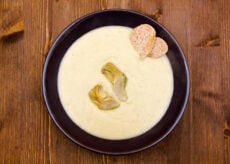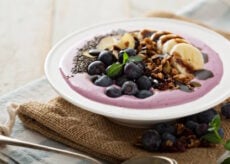Does Snacking Increase Your Metabolism? See the Science

There are many reasons to snack throughout the day. It can help prevent you from becoming overly hungry, only to overeat at your next meal. It can help boost energy if you’re feeling a slump. And some people believe it helps increase your metabolism through the thermic effect of food. 1 That is, every time you eat, it takes energy to digest and absorb the foods you eat, which can cause a temporary boost.
But does that mean that snacking really increases metabolism? As with so many nutrition and fitness questions, the answer is, it depends. In other words, it depends on the foods you choose to snack on, when and why you eat, as well as your body type.
For instance, in one study with active, lean, young adult men, metabolism was shown to increase after snacking on a high-protein or high-carb snack. Even if that snack was consumed shortly before bed, the guys were able to burn a small amount of extra calories by increasing their resting energy rate. 2
Other research, however, has been much less positive. Most research indicates there’s little, if any, effect of eating several times a day over eating just three (or even less) times when it comes to overall energy expenditure. 3 Another study compared folks who ate twice a day versus those who ate seven times and found no difference in calories burned. 4
One more study, this time with obese individuals following a very low-calorie diet, again noticed minimal changes in energy expenditure no matter if they ate once, three times, or five times per day. 5 Another study found that snacking can decrease appetite and hunger levels, but depending on the snack, it can still add up to too many calories. For example, the study found that overweight men who ate a snack containing 200 calories following breakfast, ate only 100 fewer calories at lunch. Those extra 100 calories in the day can make it significantly harder to lose weight. 6
That may, however, also depend on what you’re snacking on. For example, another study found that those who ate high-protein, high-fiber snacks lowered their levels of ghrelin (the hunger hormone) and had higher levels of GLP-1 (a hormone that registers fullness). In this study, the participants ate up to 425 fewer calories daily, which would obviously make it easier to lose weight. 7
To Snack or Not to Snack?
Should you eat or drink something between meals if it doesn’t seem to have much, if any, effect on metabolism? Again, it depends. Factors that can change snacking from good to bad include:
- Why you’re eating: are you eating because you’re hungry, bored, overwhelmed and need a break, to be social, or because your energy is running low?
- What you’re eating: higher protein, higher fiber snacks help keep hunger at bay longer and help reduce consumption of calories at future meals more than foods higher in fat or refined carbs. 8
- Whether you’re already lean or overweight: snacking appears to be healthier for folks who aren’t already struggling to lose weight.
- What time you’re snacking.
Some studies suggest there’s no effect on weight loss with or without snacking. Others show it helps, and others show it hinders weight loss. 8 – 11 With all of the mixed results, whether snacking is healthy could be highly individual, depending on the person and the circumstances.
How to Snack More Healthfully
Sure, snacking may not really help boost metabolism, but there are good reasons to snack, including keeping energy levels high and avoiding getting too hungry, which can lead to headaches, brain fog, low energy levels, and consuming too much food later. To help ensure you don’t consume too many calories or spike blood sugar levels when snacking, here are a few simple guidelines:
- Go for protein and/or fiber, which can help decrease hunger for future meals and cut back on cravings.
- Watch your calories per snack, shooting for snacks that are ~200 calories with 10+ grams of protein.
- Be aware of why you’re snacking—are you snacking because you’re truly hungry, or are you eating something because it’s tempting, you’re bored, or you’re feeling uncomfortable?
- Base your snacks on your activity levels. If you’re on a long hike, some nuts and fruit can help you keep going. But when you’re stuck sitting all day long, you probably won’t need the extra calories. As a general rule, enjoy two to three snacks on those days when you’re highly active and drop down to just one if you’re behind a desk or sitting on the sofa.
- Arm yourself with healthy snacks—keeping portable yet healthy snacks can help you avoid grabbing an unhealthy option, especially if you’re on the go. Some good go-to snacks include Greek yogurt with berries, nuts, whole fruit, popcorn, cottage cheese, hard-boiled eggs, string cheese, fresh veggies, and seeds.
- Avoid unhealthy, highly processed snacks, which provide a quick energy boost due to their high-sugar content, but only leave you crashing and feeling even hungrier an hour or so later.
Snacking may not do much, if anything, to actually boost metabolism, but it can keep hunger at bay, especially during a busy, active day. It can also provide much-needed energy. Just remember to ensure you’re eating because you really are hungry, and keep healthy snacks available, so you’re less likely to reach for something that isn’t on plan.




 7 Signs Your Body is Seriously Low on Collagen (not just wrinkles)
7 Signs Your Body is Seriously Low on Collagen (not just wrinkles) Health Expert: "Turmeric Doesn't Work (unless...)"
Health Expert: "Turmeric Doesn't Work (unless...)" 3 Warning Signs Your Probiotic Supplement is a Total Waste
3 Warning Signs Your Probiotic Supplement is a Total Waste

